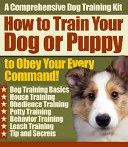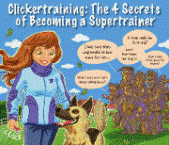Good Dog Training Advice
Get Fast & Simple Dog Training Tips to
Turn a Difficult Dog Into an Obedient Pet!
Behaviour Changes in Senior DogsLiving with your dog through the years is an unforgettable experience. As the dog grows the bond between the two of you also becomes stronger. Sometimes it is easy to forget that dog’s age and the energy they had as pups will not be the same ten years to come. Knowing what changes to expect will make the transition for you and your dog easier. It also ensures that those golden years for your dog are not filled with discomfort and awkward moments in case of some “accidents.” Effects of old age begin early but may go unnoticed. At the age of eight years, your dog will start to slow down. In some dogs the effects may be earlier at seven years or later. So what changes do you expect? 1. Skin The skin will change with age. In younger dogs the coat is shiny but in older dogs the coat will become dull and there is increased hair loss. In dogs that previously had a thick coat, this will thin out as they grow old. 2. Gums and teeth These are the earliest to show the effects of the age. In fact the age of a dog can be determined by looking at the teeth. As the dog ages tartar accumulates in the teeth, some teeth may become loose and fall out. Ensure that the teeth are cleaned regularly and any loose teeth removed. 3. Eyes and ears When dogs are young, they are alert and can pick out even the slightest of sounds. However with age these two senses become less sensitive. It is not uncommon for dogs to lose their eyesight or become unresponsive to sound. Sensitivity to sound is tested by clapping your hand together loudly near the dog, if the dog’s hearing is good they respond by piquing their ears and turning toward the source of the sound. If your dog has lost hearing it is important to keep them on a leash or in the house where someone can watch them. This is since they are more prone to accidents; a deaf dog wandering into the street may be hit by a car since it cannot hear the car screeching. 4. Activity With increased age the dog will not be able to pull off the stunts he did as a pup. However this comes at a cost, the dog may gain a lot of weight during this time. To avoid the dog becoming obese, ensure that the dog gets regular exercise. You may take out the dog for a walk every day 5. Nutrition Older dogs may have reduced appetite and while they require lesser portions of food their food should be more nutritious. Some dogs may require special diets due to medical conditions. Since the digestive process is slowed down then you may need to feed small portions of meals at frequent intervals rather than one big meal. This will reduce the chance of constipation. 6. Health Most conditions seen in old dogs are due to degenerative changes. However older dogs are also at an increased risk of other diseases due to their compromised immunity. Thus your dogs should get regular check-ups to ensure that he is in good health. Keep your dog disease free by ensuring that he gets all his shots in time as well as keeping him in a clean environment. Proper nutrition combined with good hygiene is a must. This are some of the most noticeable changes that you will see in your dog as they age and they should not be too much of a concern to you if you understand. Make sure you check out this free dog life saving video below, you'll be so glad that you
did: | |
|


Discover the Secrets to Training Your Dog Or Puppy. Huge BONUSES for a limited time only!
Click here now...
|
http://GoodDogTrainingAdvice.com





